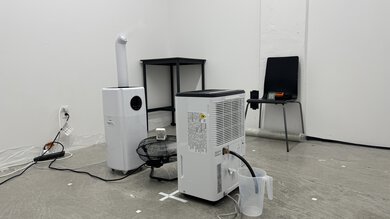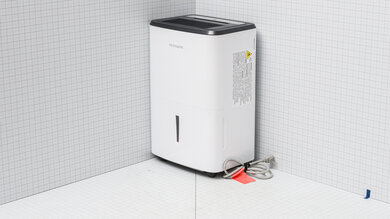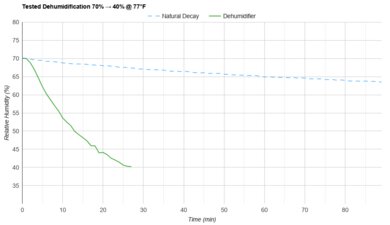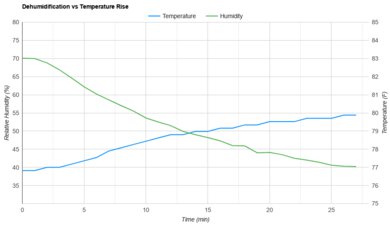
A dehumidifier can help clear out moisture in any room in your home, but basements are likely to benefit most from this device, as they can get pretty damp. A couple of features make or break a dehumidifier for basement use. Good dehumidification capacity is a must, as is a wide range of fan speed settings; the optimal fan speed to effectively clear out moisture can depend on a wide range of environmental factors, and a fan speed that might work well in one room won't necessarily work well in the other. You can read about our findings here if you'd like to see a more in-depth examination of how your dehumidifier's fan speed can impact its ability to pull moisture from the air. Drain pumps are another helpful addition, as they allow the dehumidifier to pour any accumulated moisture into a faraway floor drain or sink on a tall vanity.
We've tested 20 dehumidifiers, and below are our recommendations for the best for basement use among those that we've tested, based on their dehumidification performance, price, and feature sets.
-
Best Dehumidifier For Basements
BasementPerformance Usages: CapacityTemperature StabilityNoiseThe best dehumidifier for a basement that we've tested is the Frigidaire FFAP5034W1. This 50-pint unit provides excellent dehumidification capacity, making it a great choice for larger dens. Its three fan speed settings offer a broad spread of air speeds, generating between 275 CFM and 179 CFM pf air movement, making this unit especially flexible in basements where the ambient humidity and temperature vary daily. Not only does it feature a fairly large 2.2 gal (8.3 L) water tank, but you can also connect a hose to its drain port for continuous drainage or use its built-in pump to have it drain into a faraway spot. It's also impressively energy-efficient, with an Energy Star rating of 1.9L/kWh, so you won't notice too big a hit to your energy bill, even if you have to leave it running for extended periods.
With all that said, it's worth noting that this dehumidifier makes quite a bit of noise at its highest fan speed and produces a fair amount of heat, so you might want to keep it far away if you use it in a finished basement where you watch TV or entertain guests. While this dehumidifier isn't the largest 50-pint model on the market, you can take a look at the Midea MAD50PS1QWT if you want something with the same capacity that's a little smaller, thanks to its space-saving collapsible design. Just be aware that it's even noisier than the Frigidaire and generates more heat.
-
Best Mid-Range Dehumidifier For Basements
BasementPerformance Usages: CapacityTemperature StabilityNoiseIf you're shopping at a mid-range price point and have a smaller basement that doesn't require as big a machine, the Midea MAD35S1QWT is among the best dehumidifiers for basements we've tested. It's outgunned in terms of raw capacity when compared to 50-pint models like the Frigidaire FFAP5034W1, and it has a harder time clearing out moisture in big, open-concept dens, though it should still do fine in medium-sized basements. Its two fan speed settings also provide a smaller spread of air speeds when compared to the Frigidaire dehumidifier's three fan speed settings, making it a little less flexible in different ambient conditions. While its collapsible design saves on space when the unit isn't in use, this is still a pretty bulky machine when fully deployed, especially compared to other 35-pint models. Its 4.2 gal (16.0 L) water bucket gets pretty heavy when filled, too, making it a bit of a nuisance to empty.
That said, if you'd rather drain it into a sink in a furnace room or faraway floor drain, you can detach it from its water bucket, hook up a hose to its drain port, and activate the built-in pump. This device is also Wi-Fi enabled, allowing you to operate it remotely through the MSmartHome smartphone app or via voice commands made through Amazon Alexa and Google Home devices. To use this functionality, just make sure your basement has good Wi-Fi connectivity.
-
Best Budget Dehumidifier For Basements
BasementPerformance Usages: CapacityTemperature StabilityNoiseCheck out the AGLucky OL12D-D023B, also sold as the Auseo OL12D-D023B and KISSAIR D4212B-UC on Walmart's online store if you're on a budget or have a smaller basement that doesn't require as big or bulky of a device. It has a much smaller 0.5 gal (2.0 L) water tank than the Midea MAD35S1QWT or Frigidaire FFAP5034W1, and while it has a port for continuous drainage, it lacks a water pump. This means you can't have it pour any accumulated water into a faraway floor drain or any elevated container. Its nine-pint capacity is also far less than those aforementioned full-size models, and it produces far lower airflow, maxing out at just over 50 CFM. That means it'll have difficulty dealing with moisture in anything other than moderately sized spaces, like an especially small basement, a guest bedroom, or a furnace room.
It also takes up less room, and its 21.7 lb weight is roughly half that of the Midea, making it much easier to move around, even considering the latter's caster wheels. Even at its highest fan speed, its operating noise of 43.2 dBA falls roughly within the same ballpark as a refrigerator, and it's unlikely to be much of a distraction if you leave it on while watching a movie or listening to music. It doesn't output much heat either, so even smaller rooms won't feel too stuffy if you leave it running for an extended period.
-
Best Basement Dehumidifier For Small Spaces
BasementPerformance Usages: CapacityTemperature StabilityNoiseIf you only need a dehumidifier for pulling the moisture from a small space in your basement, like a storage closet under your stairs, the ProBreeze PB-03 is worth a look. It's a much different proposition to the other, more conventional models on this list; its dehumidification capacity is downright pitiful even when compared to the AGLucky OL12D-D023B's modest performance. Of course, it isn't intended for the same purpose—the ProBreeze's highly compact size makes it a cinch to fit in tight spaces. If you stick it in an enclosed room or semi-enclosed area, it'll be almost inaudible, as it emits only 44.6 dBA while running. Its heat output is also practically negligible.
Its water tank is very small, and this dehumidifier lacks a port for continuous drainage. However, since this unit's dehumidification rate is so slow, neither of those things is a significant concern, as you'll only really need to empty its tank every week or so. Besides, it features an automatic shutoff for when the tank is filled, so there's no need to worry about overflow.
Notable Mentions
- GE APYR50LC: The GE APYR50LC is a 50-pint dehumidifier. It performs quite similarly to the Frigidaire FFAP5034W1 and has a slightly more compact body. It also has an automatic fan speed adjustment function for differing humidity levels. That said, the Frigidaire has a larger water tank, makes less noise, and has slightly less impact on a room's ambient temperature. See our review
- GE ADHL35LA: The GE ADHL35LA is a 35-pint dehumidifier. It's smaller than the Midea MAD35S1QWT and will have a slightly lesser impact on a room's ambient temperature. Its water tank doesn't hold nearly as much water, but it's much easier to empty than the Midea's bucket. That said, the Midea runs quieter and has a built-in drain pump. Thanks to its Wi-Fi connectivity, you can operate the Midea remotely using a smartphone app. See our review
- Whirlpool WHAD50PCW: The Whirlpool WHAD50PCW is a full-size 50-pint dehumidifier. It provides a similar dehumidification capacity to the Frigidaire FFAP5034W1. However, its water tank is smaller, and it's also louder and generates more heat. See our review
- Midea MAD50PS1WS: The Midea MAD50PS1WS is a 50-pint dehumidifier. Like many other 50-pint models we've tested, it's a viable alternative to the Frigidaire FFAP5034W1, with similar overall dehumidification capacity. However, the Frigidaire runs quieter and outputs less heat. See our review
- ProBreeze PB-02: The ProBreeze PB-02 is a compact dehumidifier, even smaller than the ProBreeze PB-03. That said, given the relatively minor difference in size between the two devices, the PB-03 offers noticeably better dehumidification capacity and has a bigger water tank. See our review
All Reviews
Our recommendations above are some of the best basement dehumidifiers for most people. We factor in the price, feedback from our visitors, and availability.
That said, no single best option will suit everybody; your needs will depend on your budget, the size of your basement, your tolerance for operating noise, and whether you like having a device with convenience features like Wi-Fi connectivity or a drain pump. If you'd like to choose for yourself, here's the list of all our dehumidifier reviews.



















